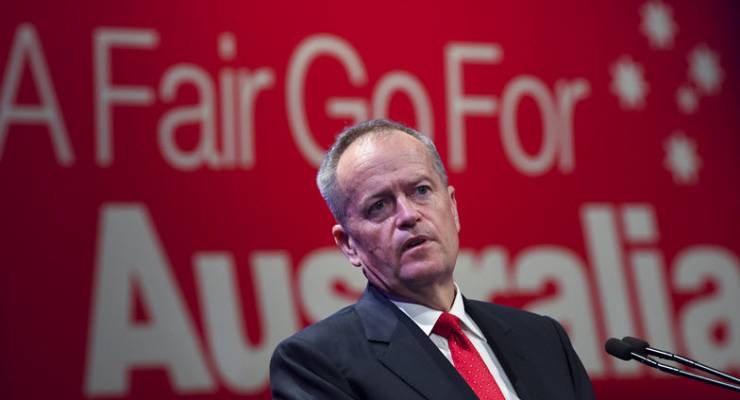
Every election the Coalition wheels out the same refrain; the Labor Party is dominated by unions. The fact that the Labor Party is not only influenced by trade unions, but was formed by them in the 1890s is not exactly hot off the presses.
Then as now, the fact remains that class is the touchstone of political discourse and will continue to be so as long as most people’s primary saleable commodity is their labour power.
No political operator can afford to lose touch with an understanding of class, as the Australian Democrats learned, even if it has to be alluded to euphemistically; “working Australians”, “battlers”, “top end of town”, and more recently, “if you have a go you get a go” for the earnest middle class.
For a period after Tony Blair’s victory in Britain in 1997, there was much fanfare around Blair’s ability to secure Britain’s middle class for Labour and make it habitable terrain. There is a fair amount of debate about whether Blair actually captured much of the middle class — nevertheless that political strategy, known as “triangulation”, crept into political folklore and became influential within many social democratic parties.
That strategy, which amounted in essence to Social Democratic parties taking their working class supporters for granted in order to woo the middle-class, has, in combination with macro-economic changes, seen the traditional working-class base of social democracy erode significantly. With changes to manufacturing, mining, and other industries that were once densely unionised, the informal transmission mechanisms for laborism have gone into a steady state of decline.
While it remains the case that Labor does best in industrial belts where votes are weighed rather than counted, a look at the AEC list of candidates for the 2019 federal election reveals something unimaginable a generation ago. Not only the number of far-right parties scrambling for votes, but the number of workers who once would have been the bedrock of Labor support who are now standing as candidates for formations like Fraser Anning’s party.
Labor’s candidate list is crowded out by professionals. There’s nothing wrong with having a broad base of support and representation, but it’s a question of degree. There are 17 candidates you might describe as workers standing for Labor out of 136 candidates, while Anning’s party has 18 of 70. There’s no doubt that so far as policies go, Labor has the best interests of Australia’s working class at heart, while Anning’s politics is anathema to working-class organising principles — but it feeds into a cynicism that workers are squeezed out politically, just as they are economically.
The optics are not good. The representation of working-class interests through euphemisms, sound bites, and imagery can be dismissed as a war of representation and misrepresentation, that Anning’s supporters are jingoistic nostalgia monsters and political frauds — but Labor’s lack of candidates drawn from the labour movement is a problem.
With manufacturing all but gone, laborism is shrinking to small and isolated pools — almost nostalgic sub-cultures. Labor’s primary vote has eroded dramatically and there’s a danger that the ideas of laborism will diminish then disappear forever with the shrinking industrial sector — the twilight of the industrial idols — and with them a broad and heroic vision. An American vista of industrial decomposition looms.
It’s sometimes stated that Labor has been a victim of its own success, of re-gearing the economy and instituting successful reforms that have facilitated social mobility.
The destruction of manufacturing and economic certainty has certainly occurred, but it’s not clear that the much vaunted dividends from waves of economic reform have arrived — much the opposite. The gap between what was lost and yet to be delivered is a spectre that haunts European politics; giving the politics of hate and chauvinism space to operate in.
If Labor is to meet its political challenges, it needs to face its economic ones. Infrastructure projects loom like a light on the hill, promising jobs, good jobs, and possibly a base upon which to rebuild hope.








Sound comments, but re the reference to the 136 Labor candidates: am assuming that these are Reps candidates and that it was not possible to ascertain background of the other 15. And, no Senate candidates?
Where did Labour’s “Working Class go?”.
1) Their jobs were sent off to China or anywhere cheap.
2) Union membership declined because younger people who reaped the benefit of their actions, thought it has always been this way and will continue without effort on their part.
3) Unions have had their power so restricted that it is very difficult to gain benefits for their members.
4) Wages are down and Union dues are up (to compensate for lower membership) so many don’t join.
5) Many members of the “Working Class” now think they are more “intellectual” because of greater educational requirements. and thus of a higher Social Class than Unionists.
6) The continual deluge of misinformation and propaganda against unions in the media and by pollies.
7) The very common lack of understanding by people of what Unions do. Especially migrants.
There are a few reasons for you, there are more but my typing finger is tired.
Wot you say, 10+ I would only add the continuing abuse of visa conditions and exploitation by the unscrupulous service sector.
I would also add that the extensive system of award wages has shifted an enormously important task previously taken on by unions, to the Fair Work Commission.
Which is also why I somewhat disagree with your point 2). I think declining union membership has less to do with young people taking union achievements for granted, and more with young people recognising that no matter how important the unions were in achieving those standards, the power to maintain them now lies with others to a large degree.
A very good point.
1 + 2 are the big ticket items here.
2 doesn’t just apply to younger people but also many older people who, after all, should have known better.
Also our aging demographic played a role too as people who created the union base retired or died.
Honestly, there’s just so much to talk about in this vein – the erosion of Australian manufacturing in favour of primary industries (very much a focus of Liberal economic meddling in recent decades), the separation in the bases of both major parties as the parties became defined more by level of social conservatism or lack thereof despite bases originally centred around economic class, the effect of rising housing prices and household debt in turning the priorities of the middle class rather significantly… It’s a hard topic to get to grips with in this limited space.
After the election perhaps see if you can get a guest piece from Kos Samaras who has a lot to say about this topic.
A very good point.i remember years ago talking to my union organiser, (I was in the ARU).the gist of his argument was that the union movement had achieved virtually everything that could be ackieved.he listed four weeks leave, holiday loading, long service leave, ten days sick leave a year, compassionate leave for things like funerals, regular wage rises and other improvements in working conditions.his point was that when he approached new employees to join the union a number of them would say that there was no need to join a union as the conditions had all been achieved.his worry was that the employers would always be ready to turn back the clock if the unions were not vigilant.we saw with Work Choices that this is very true.the main reason for the low union membership now is the need has gone for a big rise in working conditions.if the workers are not careful they will pay the price.
Talking about paying the price.
How about an unpayroll tax. If an Australian company ships an Australian job offshore they have to still pay the payroll tax plus a loading to cover lost income tax.
In addition eliminate payroll tax as it’s counterproductive to job creation.
Imagine the fun Leigh Sales would have with some poor schmuck who is plucked out of the prols to stand for the ALP. Now that politics is a blood sport and the msm are the cheer/hit squad it’s no place for decent working people. Leave it to the IPA graduates and lawyers who’ve worked for the Unions.
Paul Keating never went to uni. Don’t get too elitist there.
I know a few passionate prols who would deal with the Sales or Parrots of the media. If you’ve shovelled shit for years people like them are the enemy, to be dismembered. Not all working people are as inarticulate or stupid as Pauleen’ wipe the snot off your lip’ Hanson.